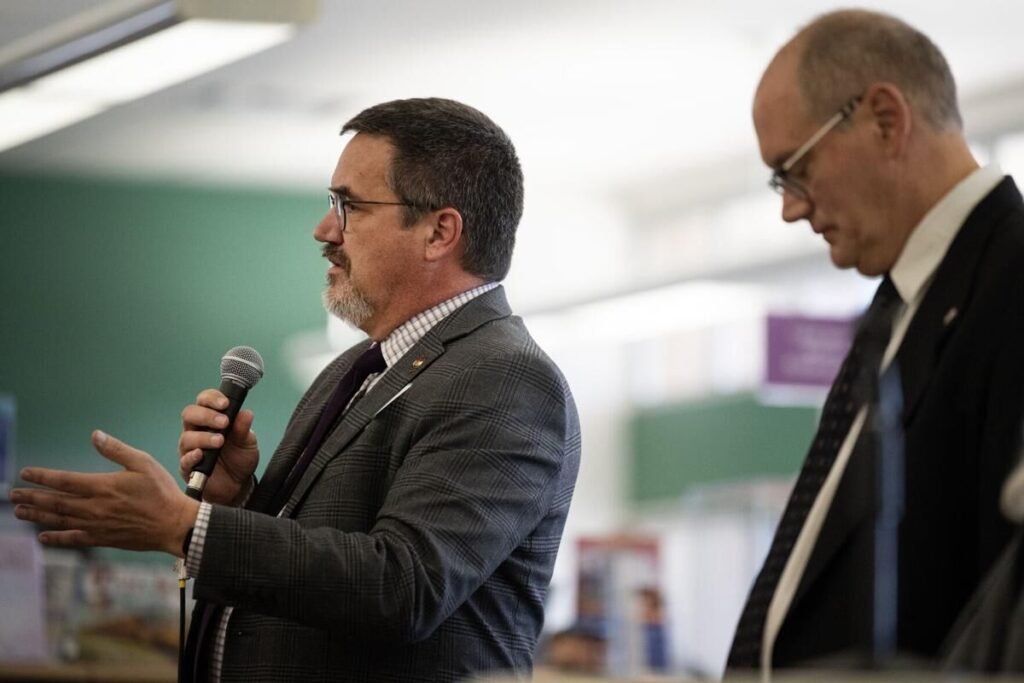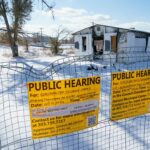Denver to pay nearly $5M settlement over curfew arrests during 2020 protests

The costs of lawsuits filed in the wake of Denver’s 2020 protests continue to pile up.
The Denver City Council approved paying $4.72 million Monday to settle claims representing hundreds of people arrested for violating an emergency curfew put in place by the city during the 2020 protests sparked by George Floyd’s murder by police officers in Minneapolis.
Denver’s councilmembers approved the settlement, which was on their consent agenda, without discussion at Monday’s meeting.
The settlement resolves one piece of a broad-sweeping federal lawsuit that saw another set of claims for excessive force by police go to trial last year.
An eight-member jury awarded a group of 12 protesters $14 million total, though a judge later reduced one award against an individual officer from $250,000 to $50,000, and the city may still appeal the verdict. That group includes now-state Rep. Elisabeth Epps.
Federal district court Judge R. Brooke Jackson wrote in a 2021 order that attorneys estimated nearly 300 people fell into a category of protesters arrested only for violating the emergency curfew or failing to obey a lawful order, and whose cases were later dropped.
Attorneys for the protesters planned to argue at trial that city officials only enforced the emergency curfew against people engaging in protest activity, even though the policy’s language was generally applicable, according to a trial brief filed in April. The curfew was initially 8 p.m. and later 9 p.m., and was in place from May 30 to June 5.
“Significant evidence at trial will be presented by Denver policymakers and high-ranking police department officials who, Plaintiffs contend, have basically admitted that the policy or practice was to arrest those the City believed were engaged in ‘protest activity,’ as the City sought to ‘clear the streets’ of people protesting police violence,” the brief stated.
The protesters said what they called selective enforcement of the curfew violated their protections for free speech under the First Amendment, protections against improper seizures under the Fourth Amendment, and rights to equal protection under the 14th Amendment.
In a March 2022 order, Jackson allowed the First and 14th Amendment claims to go forward, but threw out the Fourth Amendment claim. He wrote that if the curfew were enforced selectively against protesters, it would not stand up to constitutional muster because it discriminated against people based on the viewpoints they expressed.
Denver has defended the behavior of its police officers during the 2020 protests by saying they had to adapt quickly to the rapidly unfolding protests that included some protesters assaulting officers and engaging in property destruction. Attorneys for the city argued in a February 2022 motion for summary judgment that police officials treated the curfew as a tool to manage “violence and destruction” by some protesters, and officers only arrested people who did not comply with the curfew.
Court records indicate attorneys for the “arrest class” and the city were preparing to go to trial as recently as this spring, but finalized the settlement by mid-July.
Aurora sues Denver for costs of excessive force lawsuits filed after George Floyd protests
The settlement is one of several approved this year in cases alleging misconduct by police during the 2020 protests. The city agreed to pay $1.6 million to a group of six people in March.
Also among the settlements, the city agreed to pay $350,000 to a couple not participating in the protests but who claimed chemicals from pepper balls used by police filled their car, which they sometimes needed to live in, and led to birth defects in their then-unborn daughter.
Another settlement in a case brought by a group of four protesters is pending approval by the city council, and details have not yet emerged. The group alleged Denver police gassed them without warning, shot at them with pepper balls and shot one of them in the head with a 40 mm launcher. They brought their case on behalf of anyone who suffered similar injuries.
The lawsuits have strained the relationship between Aurora and Denver.
Aurora Mayor Mike Coffman recently proposed pausing the sharing of police resources between the two cities, arguing that Denver should pay for defending Aurora officers while the latter were under Denver’s command.
Aurora also filed a lawsuit, asking for the Denver District Court to require Denver to pay legal fees, settlements and jury awards in lawsuits that included Aurora arising out of the 2020 protests. Aurora wants enforcement of an agreement and state law that the city said obligates an agency requesting law enforcement aid from other jurisdictions to pay the costs of claims arising from the aid provided.
Several law enforcement agencies had sent officers to Denver to aid the city with its response to the protests in the summer of 2020. At least four lawsuits have named Aurora police officers or the city, according to Aurora’s complaint.
The two cities did not elaborate on the disagreement beyond a brief joint statement that reiterated their disagreement.
“Aurora and Denver disagree on which municipality should cover costs associated with legal challenges to the Aurora Police Department’s involvement in the George Floyd protests that occurred in downtown Denver in May 2020,” the two cities said. “Denver does not believe it is legally required to pay for claims against Aurora and its police officers. While Aurora and Denver argue their respective positions in court, they will continue to work together outside court toward a safer metropolitan community.”
Denver settles another federal case over 2020 protests














